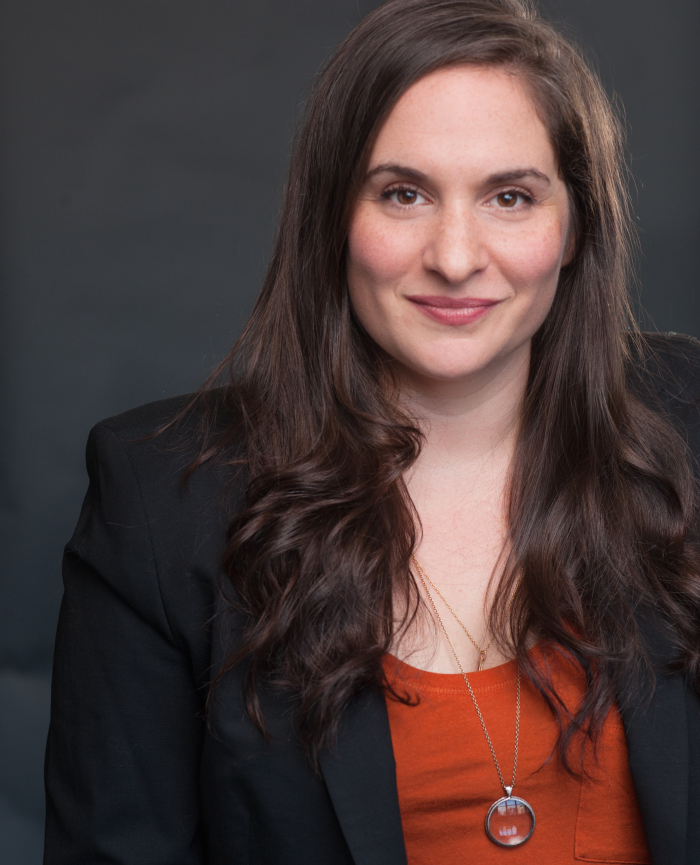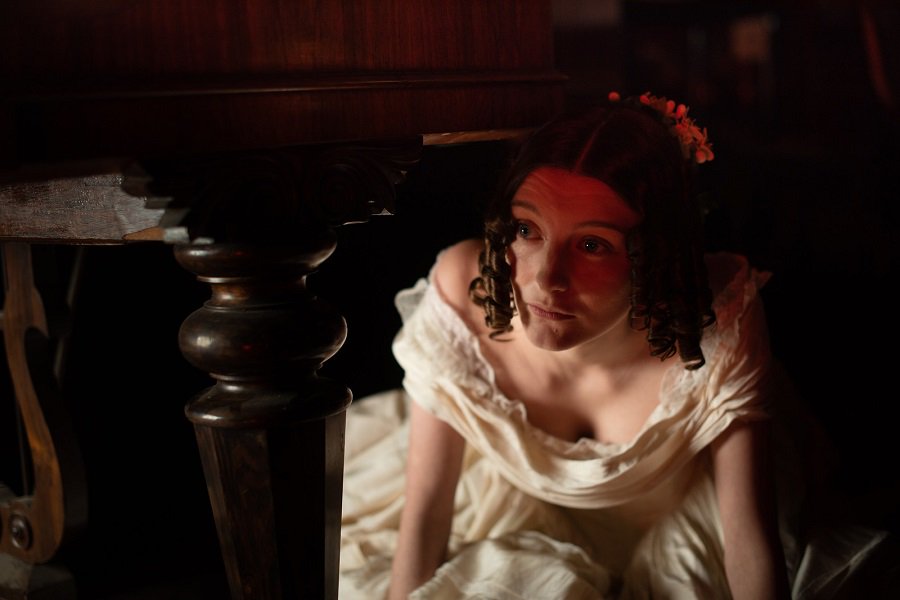An interview with Alix Sobler
by Kasia Mroczkowska

Alix Sobler is an award-winning playwright and performer from New York. We are thrilled that her most recent play, The Glass Piano, will have its world premiere on our stage later this month. Here Alix discusses why she has decided to adapt Princess Alexandra’s extraordinary true story into a play, reflects on her creative process, and gives us lots of reasons to see The Glass Piano.
How did you first come across the story of Princess Alexandra and her ‘glass delusion’ fixation and what made you want to adapt this extraordinary true story into a play?
I am always interested in lesser know stories from history, or stories we know, looked at from a different angle. I first heard about Alexandra while listening to a podcast called Stuff You Missed in History Class, and I was immediately intrigued by this idea. I have always been fascinated by the power of the human mind to convince our body of something, or to make us deny reality. Alexandra’s story immediately compelled to me as an embodiment of this question, and so much more. Also, I was struck by the image of her I formed in my head: a young, likely tiny woman (from descriptions) creeping down the hallways of her giant castle. To me, it was immediately very theatrical, as it would impact the physicality of this person so enormously, and their immediate environment. I imagined it would be tragic and hilarious at the same time. (My favourite combo!) It seemed to me a strong metaphor for anxiety, something I have dealt with all my life, how terrified to move you can become, how full of panic. The desire to protect yourself can keep you at a distance from other people, afraid to take any risks. I also thought of how her character embodies some of the struggles of being a woman, she wants so badly to express herself, but always feels like she is taking up too much room. There’s an element of what we now call body dysmorphia in her inability to see herself for what she really is.
Also I thought, “Well how on earth could you tell this story?” And then I had to set out to find the answer.
Could you describe your creative process of working on a new play?
Every play is different, depending on the style, subject, theme and deadline. But in general I tend to ruminate on an idea for a long time before I begin working. Sometimes that is a matter of months, sometimes it’s years! I will often spend years “soft pitching” the idea to myself and different people, trying to work out what the story really is, what about it compels me, how that translates to a work for the stage. I like to think over the themes and characters that might be involved, but I usually know I can start writing when I have settled on the tone. Tone is an elusive thing, very hard to describe in writing (ironically!) but that is usually where my work emerges from. I have a general idea for a story (a princess who swallowed a grand piano made of glass) and a tone (dark-humour meets magical realism and a touch of the absurd). During this time I also do research when possible. Then I begin to just write. I don’t keep track of who exactly is speaking at first, they are just unnamed, undefined voices who are a part of this story. Eventually it starts to become clear who is who- oh, it’s her father who is too busy pining over someone to pay any attention to her, it’s her maid who essentially has stood in for her mother and is smarter than everyone else, oh this stranger who has arrived is falling in love with her. I handwrite all my plays to begin with and I usually generate 50-75% of the play in a notebook before I open my computer. Then, transferring the work I have done is both weaving the pieces together, and also like working through a second draft, cutting things that no longer work or expounding on things that are more interesting as I go. Every part of writing a play is both joyous and difficult for me, but none is more joyous and difficult than endings! And ending is so important, it is what your audience leaves with, and the right ending can make up for a multitude of sins, where a lesser ending will undo some of the hard work already done. So I really try to find the way to end my plays that will do justice to the lives of the characters I have created. Often, I have a general idea of how the play will end when I begin, but it doesn’t always stick. I almost never outline, and if I do it is very late in the process, just to make sure events are clear and in the right places.
And of course that is all just the process of getting the play written! Once it gets into rehearsal and you have the input of a director and so many other artists, there are many new phases of the creative process. I often think of creating a play as a microcosm for having a child. At first, it’s just a sparkle in your eye, a gestating idea, living inside you as it grows. Then, you bring it into the world, raw, unfinished, but existing outside of you. You work on it bit by bit as it grows more nuanced, complex, taking on a life of its own. Workshops and readings are like primary school. It’s venturing out into the world to meet other people, become influenced by other voices and ideas, but it’s still primarily your baby. The first day of rehearsal for a production is sending it off to college or it’s very first job. It is filled with the ideas and input of other people, it begins to feel very separate from you, but still needs your help and guidance from time to time. Opening night is graduation or maturation. After that, it is its own entity in the world. It’s out there, living a life of it’s own, standing on its own two feet, interacting with people who will love it, hate it, or be indifferent. You’ve done what you can, it will always be yours, but now it also belongs to the world.
It’s not a perfect metaphor, I often make changes to a play even after it’s been produced, but eventually you do have to let it go and stand on its own. This idea really helps me with the separation anxiety I sometimes feel as it becomes something less and less connected to just me.

You’re based in New York, but came to London for the first day of rehearsals. How did it feel meeting the actors playing the characters that you have created?
Meeting this amazing cast was a pleasure! Max has done such wonderful work assembling a group of thoughtful, sensitive, committed and funny actors. I loved watching them begin to discover their characters, where they overlapped with them in personality and how they were different. I enjoy being in the room with actors and figuring out things together. In the beginning I know the play better than anyone else, but it doesn’t mean I have every answer. Many times the actors asked me questions I hadn’t thought of, and then we figured out what best served them and the play. I also joke that for me, being from New York, British accents in my work automatically make every script sound 10-30% better! That’s probably not strictly true…it’s just that these are a wonderful group of actors. They are the ones elevating the work.
Concert pianist Elizabeth Rossiter plays live on stage through the play. Was this in mind when you were writing it?
Elizabeth is such an incredible addition to this piece, and we are so lucky to have her. Having a live pianist on stage was definitely a dream, but it is not required and not in the script. But perhaps it will be moving forward. Max brought her on board as part of his vision, and I think it fits in perfectly. It is hard to imagine the play without it now. Of course not every space can accommodate a grand piano on stage, so I think it will be a suggestion but not a requirement.
What makes The Glass Piano’s story relevant today and what do you think audiences can expect from seeing the play?
I think love stories are always relevant, and at its heart, The Glass Piano is about our human need for connection. Finding connection with other people is essential, whether is a romantic, familial, or friendship. Yet, making those connections makes us vulnerable to being hurt, to feeling other people’s sadness. It can be one of the scariest things we do. One needn’t be royalty to feel constricted by certain rules and parameters in our lives. I think audiences might be surprised how much they relate to Alexandra, and the other characters. We might not suffer from glass delusion, but feeling vulnerable and anxious is quite common for a lot of us. We all struggle to communicate, to do right by other people, to come to terms with past traumas or mistakes or people who have left but haunt us still.
The audience can also expect a very beautiful experience. The theatre is incredible and Max and the whole team are putting together a very stunning production. I can’t wait to see it myself!
The Glass Piano runs from 26 April – 25 May.